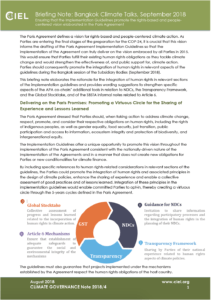In next week’s final preparatory meeting before the Paris Climate Agreement Guidelines are finalized, Parties must more explicitly address the social dimensions of climate policies.
The adoption of the Paris Climate Agreement in 2015 offered the promise an integrated approach to climate action and human rights. Indeed, the agreement was the first global environmental treaty to refer to human rights explicitly. It also stressed the fundamental priority of safeguarding food security, the imperative of a just transition, the need to respect the rights of indigenous peoples and to promote gender equality, and the central role that public participation and access to information should play in climate policies.
Thus, the greatest accomplishment of the Paris Agreement was not only aligning all countries to reduce emissions urgently, but also offering a vision of people-centered climate responses through which actions to mitigate emissions and strengthen resilience would empower communities and promote the rights of those most affected.
As negotiations resume to finalize the guidelines for how the Agreement will be implemented in Bangkok during the first week of September, what is at stake is the commitment of the 194 governments to this vision.
In Bangkok, the negotiations will primarily focus on technical elements of the agreement, such as greenhouse gas emissions accounting and the format of national reports. While crushingly mundane, these questions will determine whether the Paris Agreement will promote transparency and galvanize the efforts of national governments to reduce their emissions – in effect: if this Agreement will have the necessary impact to keep planetary warming to below 1.5 degrees Celsius.
In addition to these crucial elements, however, the guidelines must also bolster the inclusive and participatory vision elaborated in Paris. Doing so would promote sharing of good practices and fostering synergies with other international frameworks related to the protection of human rights, the promotion of gender equality, and the fulfillment of food security, in a manner that respects the country-driven nature of Paris Agreement implementation.
To achieve this, negotiators should finalize guidelines that ensure social issues are integrated in national commitments planned under the Agreement, and that governments, as well as relevant organizations, can effectively share their experiences with this integration to share lessons learned and best practices. The draft negotiating texts distributed in advance of the Bangkok session contain a handful promising suggestions, but these proposals must be strengthened and better articulated in order to address all the social dimensions enshrined in the opening paragraphs of the Paris Agreement. Being more explicit about the linkages between human rights and climate policies would promote policy coherence, helping governments combat climate change in a manner that also supports other societal objectives.
The guidelines should also embrace the active participation of civil society in the ongoing processes established under the Paris Agreement, for example in relation to planning effective national commitments and improving transparency around how policies are implemented by providing complementary information. While the Paris Agreement explicitly stressed the need to enhance public participation and access to information in climate policies, past rounds of climate negotiations have largely overlooked these issues.
The Bangkok negotiations next week will pave the way for finalizing and approving the guidelines in December in Katowice, Poland. And there is a lot of work to be done. Governments must now roll up their sleeves and ensure that the final draft of the guidelines embrace the full vision of the Paris Agreement. Failing to do so risks failing to deliver on the promises of the Paris Agreement at the next Conference of the Parties (COP24) in December.
By Sébastien Duyck and Erika Lennon, Senior Attorneys
Originally posted on August 29, 2018
Contacts in Bangkok:
Sébastien Duyck: sduyck@ciel.org, +41-78-696-6362
Erika Lennon: elennon@ciel.org, +1-714-381-6429
Briefing Notes for the Bangkok 2018 Climate Talks

This briefing note elaborates the rationale for the integration of human rights in relevant sections of the implementation guidelines and provides wording suggestions to strengthen specific aspects of the APA co-chairs’ additional tools in relation to NDCs, the Transparency Framework, and the Global Stocktake, and of the SBSTA informal notes related to Article 6.

